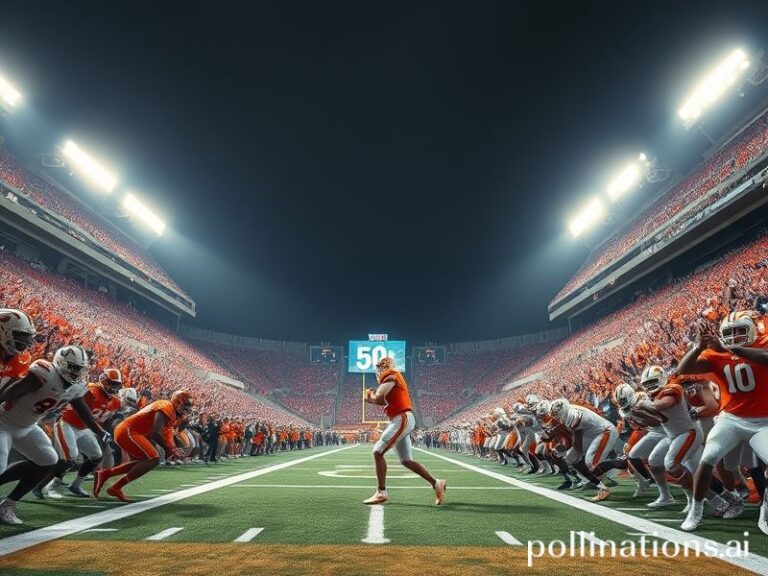South-London Derby: How Crystal Palace vs Millwall Explains the World’s Nervous Breakdown
A Global Dispatch from the Far Side of the Thames: Crystal Palace vs Millwall and the World’s Quiet Nervous Breakdown
It is 27 February, an otherwise unremarkable Thursday that happens to be hosting a South-London derby. In Croydon, baristas tattooed with the coordinates of their gap year still insist the fixture is “a bit of fun,” while in Bermondsey the tattooists wear coordinates nobody ever asked for and insist the same fixture is “a matter of life and death.” Between these two illusions lies 7.4 miles of A-road and about four centuries of mutual contempt—roughly the distance between TikTok’s headquarters and the nearest congressional hearing, but with better songs and worse beer.
To the foreign correspondent stationed in a neutral pub that smells of disinfectant and Brexit, the evening feels like a parable the planet keeps forgetting to read. The pubs are full of satellite dishes pointed at nothing in particular; CNN is looping a congressional budget crisis, France 24 is explaining why the Seine may not be ready for the Olympics, and Al-Jazeera just admitted it has run out of synonyms for “unsustainable.” The only screen showing actual sport is wedged above the urinals, where Crystal Palace and Millwall are locked in a scoreless first half that somehow still manages to look expensive. The price of admission, like everything else, has been indexed to global inflation: £42 for a seat, £6.80 for a beer, and a lifetime subscription to inherited grievance.
From an international angle, the rivalry is quaint and terrifying in equal measure. The United Nations lists 27 active conflicts this week; Sky Sports lists one that began in 1906 over an argument about whose tram depot was uglier. Both datasets are updated live, both come with casualty counts, and both are monetised by streaming services that promise “immersive experiences” to viewers who have never been south of the river or north of the Equator. Somewhere in Silicon Valley, a product manager is A/B-testing whether adding South-London accents to FIFA 25 increases micro-transactions among North-American teenagers who think Bermondsey is a craft-gin flavour.
On the pitch, the game is what tacticians call “agricultural,” which is diplomatic speak for resembling a UN food-aid drop performed by drunk helicopter pilots. Every aerial duel is a metaphor for something larger—tariffs, migration, the race to mine lithium—but the crowd refuses the metaphor and prefers the simpler poetry of calling the referee a “merchant banker,” pronounced with strategic elision. When Millwall finally score from a set piece that looked suspiciously like a hedge fund, the away end detonates. Flares the colour of overpriced saffron curl into the February sky, briefly outshining the LED adverts for a cryptocurrency exchange that went bankrupt during the warm-up.
Yet the global takeaway is oddly reassuring. In an era when wars are crowd-funded and elections are decided by whichever septuagenarian can stay awake longest on livestream, here is a conflict still governed by a whistle and the offside law. No blue-checked pundit can overturn the result; no venture capitalist can rebrand it into a “mobility experience.” For 90 minutes plus whatever the fourth official decides is stoppage time for existential dread, the planet’s nervous system reroutes its anxiety through 22 locals whose combined transfer value is less than the interest on Elon Musk’s last tax deferral.
The final whistle blows. Millwall win 1-0, proving that late capitalism still allows underdogs, provided they arrive with organised chanting and a willingness to break up the furniture. Outside, Metropolitan Police officers in hi-vis negotiate with supporters who would quite like to renegotiate the Treaty of Westphalia but have settled for a kebab. A Danish tourist live-streams the scene to 43 followers, captioning it “authentic England.” Somewhere in the Kremlin, an analyst bookmarks the feed under “soft-power opportunities.”
Back inside, the barman flicks the channel to breaking news: a fresh round of sanctions, a new variant, another billionaire in low-orbit. The patrons groan, but not about the football. They have already moved on to the ancient international language of blaming the railways. The derby is over, the world resumes its scheduled panic, and the Thames keeps rolling—oblivious, tidal, and slightly radioactive—just like the rest of us.







